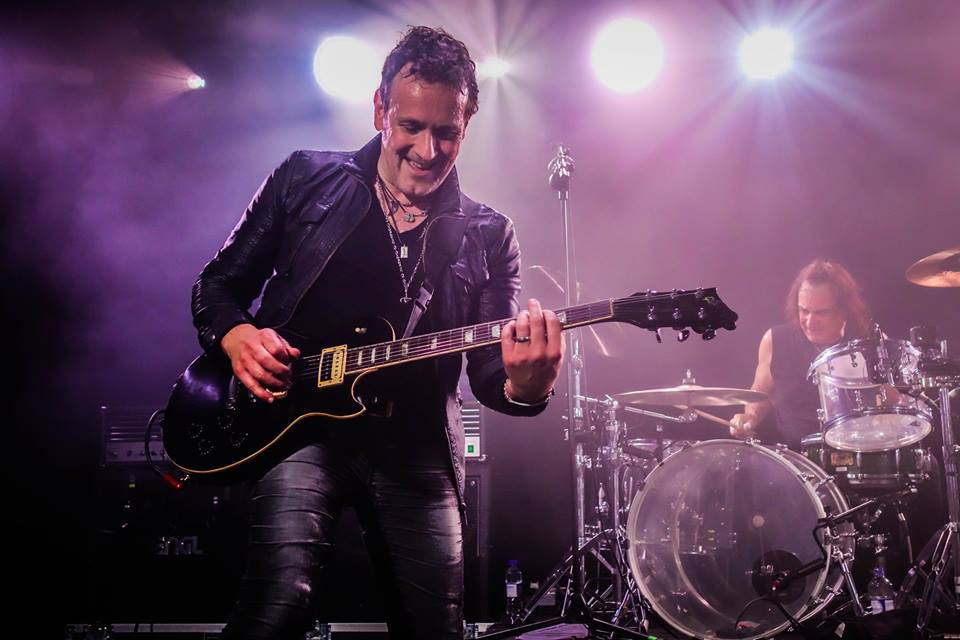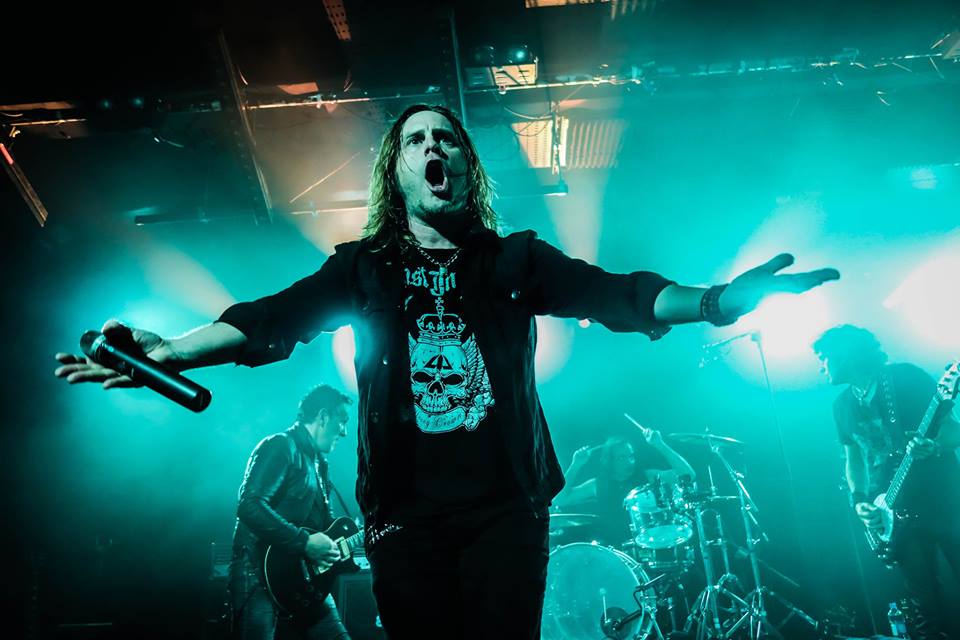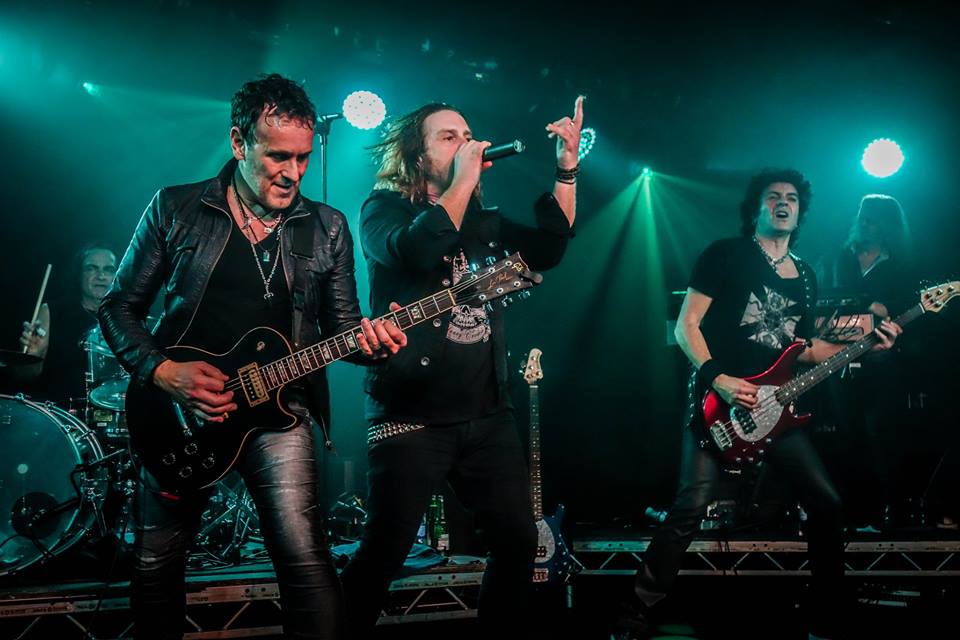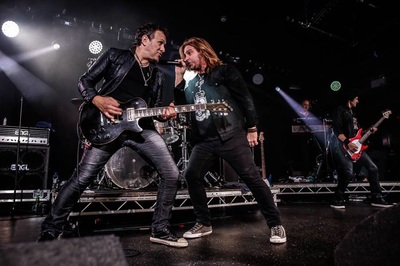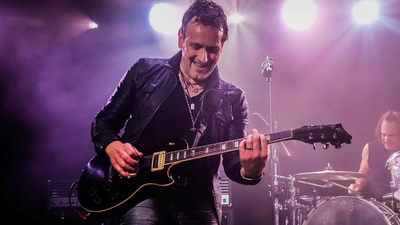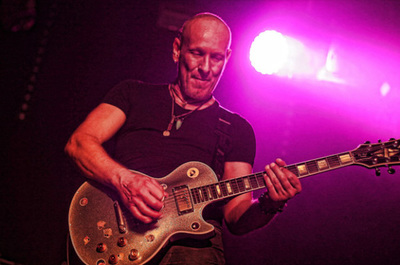|
One quarter of the original Dio band, Vivian Campbell has had tenures with Whitesnake and Thin Lizzy, not to mention over three decades in Def Leppard. Fresh from wrapping up a tour with his own Last In Line, a project he formed from with the surviving members of the Dio band, we caught up with the Irishman for a chat about his illustrious history. Here, in part one of our EXCLUSIVE two-part interview, Viv chats about the troubled history with the Dios, recapturing the magic of the music with Last In Line, and plans for a new LIL album. Caught in the middle; Eamon O’Neill.
How are you today, Vivian?
I’m tired after going to bed on a moving bus at 2am and getting up at 6am to get off to go on the ferry. That’s been the nature of the tour; it’s a club tour, so it’s not like Def Leppard where you’re in a four star, five star hotel every other night. But it is what it is, and it’s great craic, I’ve got to say that. That actually leads on nicely, because you posted on Facebook recently, sarcastically referring to it as the Last In Line ‘cash grab’ tour. You’ve got to go with it! I mean, obviously, yes, we’re raking in the dough, playing these four and five hundred capacity clubs. *laughing* Does that irk you a little, when people accuse you of doing Last In Line for those reasons? Well, people are ignorant of the business. I know nothing about carpet laying, or construction, so I would be ignorant of somebody else’s career, just as many people are ignorant of mine. People think that it’s all about money - we’re here because it’s a passion project, you know? It’s great fun. What did it feel like the first time you strapped on the guitar and got into the room with your former Dio band mates Vinny Appice and Jimmy Bain after so long? It was great. It was the middle of 2011 when I first started doing it, and I just wanted to play guitar. There was no agenda beyond that. I’d came off doing my brief stint as a ‘stunt’ guitarist for Thin Lizzy, and that brought me right back to my youth because the music of Thin Lizzy and the guitar playing of Thin Lizzy were such an influential part of my formative years when I was in my mid-teens really learning how to play my instrument. So I just got really excited about playing guitar again, and I called Vinny, I called Jimmy Bain, and I said; “let’s just go in and play”, and that’s what we did. It had been twenty-seven years since we’d played together, and as soon as we started the first song, the chemistry was just immediate, the way it had been the first time we played together in 1982. So that was a very, very exciting feeling. It was then that you added Last In Line singer Andrew Freeman.
Vinny invited Andy; he said; “we need a singer to make this complete”, and that made it very interesting, because Andy didn’t sound anything like Ronnie, and if he had, I would never have wanted to do it. Ronnie was a singular voice; he was the voice of that genre, and the best singer of that genre, so it would have been cheap to try and get a Ronnie clone. But the fact that Andy could keep up with the racket we made, and it was the undeniable sound of the original Dio band, because when Vinny and Jimmy and I play, that’s the sound we make; it’s not a contrived thing. Playing those Dio tracks, did you have to rediscover that part of you as a guitarist? I absolutely did, because the whole experience of how it unravelled, the Dio band, my getting fired, and all this shit that went on afterward; it did leave a very bad taste in my mouth. I wanted nothing to do with the music; I literally did not own the records, and I didn’t listen to the music for decades. So when we got back, and we decided we wanted to do this, those guitar solos had been on record for three decades or more, and they’re part of the DNA, and when people hear those songs, they expect to hear those solos, so I had go back and relearn them. Your musical and playing style must have changed since then. Yeah, it’s changed a lot, but it was important to me that I do them faithfully, and it was a challenge for me. My style is very idiosyncratic, and it was very erratic back then, and even back in the original days, I didn’t always play the solos the same way they were on the record. Was it like you covering another guitar player, then? It was actually. I went on to YouTube, as there were certain parts of certain solos, that I couldn’t remember if I played them in the lower register, or higher register or whatever. Just for kicks, I went on YouTube, and there was a lot of people who play along with the record, and nine times out of ten, most of them are wrong. I’d be going; “nah, that’s not it, that’s definitely not it”, and there was some anonymous guy whose face I didn’t see, who actually had a [Gibson] Les Paul like I played back in the day, and everything about it was authentic, and he had it; “YES! That’s it!” So I owe a debt of thanks to that guy, because there were a couple of little bits in certain solos that I just wasn’t sure on. So it felt good to embrace your musical past again?
I’m really embracing the music again, because things have come full circle for me, and obviously the passage of time, and Ronnie’s passing away, I think had something to do with it too. Like I said earlier, it left such a bad taste in my mouth the way things went down, but to come back at it now, I look at it in an entirely different light; this is as much Jimmy Bain’s legacy, Vinny Appice’s legacy, and Vivian Campbell’s legacy as it was Ronnie Dio’s. We created those records with Ronnie; we wrote the songs, and we worked for nothing; believe me, we worked for less than the road crew, because we were working for a common goal. We were a creative unit, even though Wendy Dio never saw it that way. So to be denied that, and then to be fired from it, and then the crap that was said about me in the press, that the Dios went on for years to say - that I turned my back on the band, that I left the band - it was absolutely untrue, and back then you didn’t have Facebook where you could go on and defend yourself, or present your side of the story. The only way to do that would have been to hire a publicist at great expense, which I couldn’t have afforded to do. It was a famously bitter split with yourself and Dio. I felt so bitter about it for so many years, and I was guilty of saying some stupid shit about Ronnie in the press, and he was guilty of saying some stupid shit about me. It’s never a good thing when people air their dirty laundry in public, but that’s the way it went down. So, I look at it in an entirely different way now; it’s our legacy, it’s Vinny’s, mine, Jimmy’s and Ronnie’s. So then to hear people say; “oh, it’s a cash grab”, or another one is people who say it’s a ‘tribute band’; how can it be a tribute band when we are what’s left of it?! Def Leppard seem to be currently having some downtime; is that giving you more time to focus on Last In Line? Yeah, well, it’s been a busy couple of years with Def Leppard; 2015 and 2016 have been very tour-intensive for us with the new record that came out a year ago. We’re going to slow down a bit next year; we’re only going to do three months in North America and Canada next spring, so that does leave me some time to do more Last in Line work, and I’m definitely going to be focusing on that. So are there plans in place for a second Last In Line album? There will be a second album. I’ve certainly started writing for it; I’ve got ideas for it. I think in January we’ll probably go in the studio together and we’ll start jamming song ideas. I don’t know when we’re going to record it, but definitely, sometime in 2017, we will finish another Last In Line record, because we’re really encouraged by the response this record [debut ‘Heavy Crown’]’s got. I mean, I think we hit the target that we aimed for, which was we wanted to make a record that was reminiscent of that era, and we went about writing and recording it in the spirit that we had approached the original ‘Holy Diver’ album in, without being contrived. There is an undeniable sound when Vinny Appice plays drums, it raises my game as a guitar player, and when Vinny and I play together, and especially when Jimmy and Vinny and I played together, it was seventy-five percent of the original Dio band, and it was a sound that we naturally had. That sound was undeniable when first single ‘The Devil In Me’ was first released. It is very Dio-esque, and everybody really shines. Jeff Pilson who produced the record, I think did an exceptional job as a vocal producer, because he’s a great singer himself, and I think he really pulled the best performance possible out of Andy. The guy who mixed the record for us and mastered it is a guy called Chris Collier. We invited Chris to the studio after we had cut the first four tracks, and played the songs for him, and urged him to go home and listen to ‘Holy Diver’ repeatedly, because we wanted that kind of sound. But the main thing that I kept impressing upon Chris was to not compress the sound along the way. We didn’t compress very much at the tracking stage, we didn’t compress much in the mixing, we compressed as little as possible in the mastering. Modern records are so heavily, heavily compressed - people want their records to be compressed so they pop out more, so their record is louder than the next guy’s. I don’t give a shit about that; I want dynamics in a record, and that’s what’s missing in a lot of modern rock music. So you wanted to get back to how the original Dio albums were recorded?
Exactly. When we did ‘Holy Diver’ and ‘Last In Line’, there were twenty-four, maybe forty-eight tracks of analogue by ‘Sacred Heart’, so you had to be careful about what you were putting into it and as a result there was ‘air’ - there was space around the instruments. Modern records, there’s so much in it, you know, you’ve got a hundred tracks on some records, and it has to be compressed in order for all that to fit in there, but the result is not always pleasing to the ear. So, it was important for us that it be in the spirit of those records for that era. Very different from a Def Leppard album then, for example. Well, Def Leppard has to be compressed, because Leppard is a very layered production band; there’s a lot of vocals, there’s a lot of stuff goes into a Def Leppard record, a lot of guitar tracks, so it’s the nature of the beast that Leppard would be like that. But even within that, I think that we do it a lot better than a lot of modern rock bands. A lot of modern rock bands don’t pay a lot of heed to the end result; “we’ve got a hundred tracks, let’s use them!” – you know?! It’s not like that with Def Leppard, nothing goes in that we don’t feel embellishes the song. Like this interview? Like us on Facebook and follow us on Twitter for regular updates & more of the same. Click HERE for part two of eonmusic’s interview with Vivan Campbell. |
|
Vivian Campbell.
"It left such a bad taste in my mouth, but to come back at it now, I look at it in an entirely different light; this is as much Jimmy Bain’s legacy, Vinny Appice’s legacy, and Vivian Campbell’s legacy as it was Ronnie Dio’s."
© 2016 - 2024 eonmusic.co.ukContact: [email protected]
|

